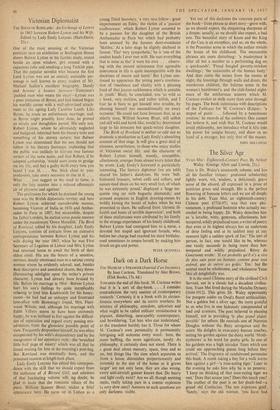Victorian Diplomatist
THE BIRTH OF ROWLAND: An Exchange of Letters in 1865 between Robert Lytton and his Wife. Edited by Lady Emily Lutyens. (Hart-Davis,
25s.) • ONE of the most amusing of the Victorian portraits now on exhibition at Burlington House shows Bulwer Lytton in his Gothic study, seated beside an open window, girt around with a capacious robe and smoking a long Turkish pipe. That the popular novelist who became the first Lord Lytton was not an entirely estimable per- sonage is well known to every student of Mr. Michael Sadleir's excellent biography. Dandy and heroine a bonnes fortimes—Tennyson's 'padded man who wears the stays'—Lytton was a poor imitation of Byron, and had indeed begun his worldly career with a well-advertised attach- ment to the ageing Lady Caroline Lamb. Like Byron, he made an unfortunate marriage; and, as Byron might possibly have done, he proved an erratic and thoughtless parent. His only son, Robert Lytton, whom he alternately neglected and badgered, inherited both his literary taste and something of his stormy nature; but Bulw.er Lytton was determined that his son should not follow in his literary footsteps, explaining that the public was unlikely to tolerate two famous writers of the same name, and that Robert, if he adopted authorship, 'would soon come to grudge me my life, and feel a guilty thrill every time you heard 1 'as ill. . . . No. Stick close' to your profession, take every occasion to rise in it. . . . What . . . you suggest as the road to fame, is only the lazy saunter into a relaxed effeminate air of pleasure and egotism.'
The profession for which he destined the young man was the British diplomatic service; and here Robert Lytton achieved considerable success, becoming Viceroy of India in 1876 and Ambas- sador in Paris in 1887; but meanwhile, despite his father's orders, he earned some poetic renown under the pseudonym 'Owen Meredith.' The Birth of Rowland, edited by his daughter, Lady Emily Lutyens, consists of extracts from an extensive correspondence between Robert Lytton and his wife during the year 1865, when he was First • Secretary of Legation at Lisbon and Mrs. Lytton had returned home to await the birth of their eldest child. His are the 'letters of a sensitive, nervous, deeply emotional man to a serious young woman whom he evidently adored; and, besides their descriptive and anecdotal charm, they throw illuminating sidelights upon the writer's private character. Lytton had already been bruised by life. More his marriage in 1864--BulWer Lytton hurt his son's feelings by quite inexplicably refusing to lend him Knebworth for his honey- moon—he had had an unhappy and frustrated love-affair with Browning's friend, Mrs. Fleet- wood Wilson; and, although his marriage with Edith Villiers seems to have been extremely happy, he was inclined to fret against the difilictil- ties of separation and regard every passing mis- adventure from the gloomiest possible point of view. Frequently despondent himself, he was often exasperated by his wife's despondency and by the meagreness of her epistolary style—the 'wretched little half page of misery' which was all that he found waiting for him in the morning's post-bag. But Rowland was eventually born, and the promised reunion at length took place.
Lady Emily Lutyens has edited this correspon- dence with the skill that we should expect from the authoress of A Blessed Girl; and admirers of that fascinating volume will, no, doubt, be glad to learn that the romantic villain of the piece. William Scawen Blunt, makes a brief appearance here. He turns up in Lisbon as a young Third Secretary, 'a very nice fellow—great improvement on Eden,' the victim of a 'passion malheureuse,' which Robert Lytton assumed to be a passion for the daughter of the British Ambassador in Paris but which had probably been aroused by the famous demi-mondaine 'Skittles.' At a later stage he slightly declined in favour. Tho' very sympathetic,' he is 'one of the coolest hands I ever met with. He uses everything that is mine as tho' it were his own . . . observ- ing with the utmost seriousness that agreeable intercourse in life is quite incompatible with the doctrines of meum and tuum.' But Lytton con- tinued to appreciate the young poet's combina- tion of 'manliness and vhality with a pleasing fund of that joyous recklessness which is amiable in youth.' Blunt, he concluded, was 'as wild as a hawk, very reckless, and rather selfish, and I fear he is born to get himself into trouble, by pleasing himself too unconditionally on every occasion.' He could not have foreseen that, as an elderly man, Wilfred Scawen Blunt, still selfish and still wild and hawk-like, would lay determined siege to his innocent but quick-witted daughter.
The Birth of Rowland is neither so odd nor so dramatic a production as Lady Emily's absorbing account of that siege. It will give a great deal of pleasure, nevertheless, to those who enjoy studies of Victorian social life; and the character of Robert Lytton himself, moody, susceptible, affectionate, emerges from almost ivery letter that he wrote. Lady Emily's foreword is particularly interesting. The literary diplomat (we are told) shared his father's dandyism. He wore 'bell-. bottomed trousers, velvet cuffs and collars, and square-toed shoes on his very small feet, of which he was extremely proud,' displayed a 'huge tur- quoise ring set with baguette diamonds,' and aroused suspicion in English drawing-rooms by boldly kissing the hands of ladies when he was presented to them. He suffered from 'chronic ill- health and bouts of terrible depression'; and both of these misfortunes were attributed by his family to the strange experiences of his lonely childhood. Bulwer Lytton had consigned him to a, nurse, a devoted but stupid and ignorant female, who, before her charge had reached his third birthday, used sometimes to amuse herself by making him drunk on gin and porter. PETER QUENNELL


































 Previous page
Previous page